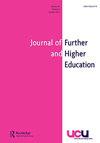‘I am surrounded by people who are not motivated to do research’: harnessing collegiality for developing research active academics in a teaching-focused institution
IF 2.4
Q1 EDUCATION & EDUCATIONAL RESEARCH
引用次数: 0
Abstract
ABSTRACT In order to achieve a university status, a teaching-focused private Malaysian University College promoted collaboration as an institution-wide strategy for developing the research capacity of staff. Enhancing collegiality was key to this strategy since resources for building research capacity were insufficient. Limited research exists on the role of collegiality in developing research capacities among academics, especially in the Global South and under such constraints. In Malaysia, a high-power distance country, difficulties arise in the practice of collegiality due to hierarchy and other socio-cultural expectations. In this qualitative study, insights into and experiences of this transition were sought in interviews with 18 academics. Collegial leadership and intellectual collegiality were identified as pivotal. Collegial leadership, which addressed the relationship between academics and institutional leaders, was lacking and participants mostly felt unsupported and disengaged under the dominant top-down, hierarchical, leadership style. Intellectual collegiality, which refers to the relationships participants had or wished to have with colleagues, was also challenging in that environment but held more promise. Actively promoting this through a process of assimilation and compromise could have been prioritised. Achievable and tangible research targets could have been negotiated so that becoming research active was a shared vision.“我周围都是没有动力做研究的人”:在一个以教学为中心的机构中,利用团队合作来培养研究活跃的学者
摘要为了获得大学地位,一所以教学为重点的私立马来西亚大学学院将合作作为培养员工研究能力的全机构战略。加强合作是这一战略的关键,因为建设研究能力的资源不足。关于大学合作在发展学术界研究能力方面的作用的研究有限,特别是在全球南方和这种限制下。在马来西亚,一个强大的远程国家,由于等级制度和其他社会文化期望,在大学制实践中出现了困难。在这项定性研究中,通过对18位学者的采访,寻求对这一转变的见解和经验。大学领导能力和智力合作被认为是关键。在自上而下、等级分明的主导领导风格下,缺乏解决学术界和机构领导人之间关系的大学领导,参与者大多感到没有支持和脱离。智力合作是指参与者与同事之间曾经或希望建立的关系,在这种环境下也很有挑战性,但更有希望。本可以优先考虑通过同化和妥协的过程积极促进这一点。本可以就可实现和切实可行的研究目标进行谈判,以便积极开展研究是一个共同的愿景。
本文章由计算机程序翻译,如有差异,请以英文原文为准。
求助全文
约1分钟内获得全文
求助全文
来源期刊

JOURNAL OF FURTHER AND HIGHER EDUCATION
EDUCATION & EDUCATIONAL RESEARCH-
CiteScore
5.20
自引率
4.30%
发文量
80
期刊介绍:
Journal of Further and Higher Education is an international, peer-reviewed journal publishing scholarly work that represents the whole field of post-16 education and training. The journal engages with a diverse range of topics within the field including management and administration, teacher education and training, curriculum, staff and institutional development, and teaching and learning strategies and processes. Through encouraging engagement with and around policy, contemporary pedagogic issues and professional concerns within different educational systems around the globe, Journal of Further and Higher Education is committed to promoting excellence by providing a forum for scholarly debate and evaluation. Articles that are accepted for publication probe and offer original insights in an accessible, succinct style, and debate and critique practice, research, theory. They offer informed perspectives on contextual and professional matters and critically examine the relationship between theory and practice across the spectrum of further and higher education.
 求助内容:
求助内容: 应助结果提醒方式:
应助结果提醒方式:


